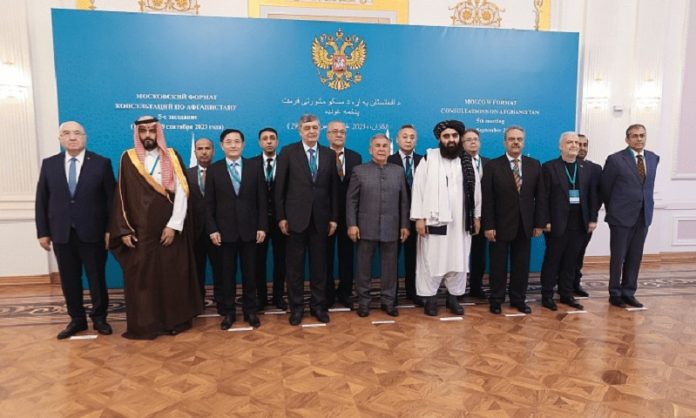A regional security meeting on Afghanistan, hosted by Russia with participation from other regional countries including China and India, has called upon the interim Afghan government to take effective measures to “dismantle” all sorts of terrorist groups based in the country and to ensure that their territory no longer serves as “terrorism hotspot”.
The call for enhanced security measures arose during the fifth Moscow Format Consultations on Afghanistan, which gathered high-ranking officials from Pakistan, China, India, Iran, Kazakhstan, Kyrgyzstan, Russia, Turkmenistan, and Uzbekistan. Representatives of Saudi Arabia, Qatar, the United Arab Emirates and Turkiye also attended the audience as guests of honour.
The meeting took place in the city of Kazan, Russia on Friday.
Islamabad has repeatedly raised concerns over the use of Afghan soil by militants for cross-border terrorism. In a recent statement, Pakistan Army had blamed Kabul for the uptick in militancy, saying that “safe havens and liberty of action”, along with the latest weapons available to militants from Afghanistan enabled them to carry out attacks inside Pakistan.
The military had said it expected the government in Afghanistan to take action against militants and abide by the Doha agreement.
“The sanctuaries and liberty of action available to the terrorists of proscribed Tehreek-i-Taliban Pakistan and other groups of that ilk in a neighbouring country and availability of latest weapons to the terrorists were noted as major reasons impacting [the] security of Pakistan,” a statement issued by the ISPR had said.
In a statement released by the Russian Foreign Ministry after the meeting concluded, the participants of the meeting expressed deep concern over the challenging security situation in Afghanistan, “primarily due to the intensified activities of terrorist groups, particularly ISIS”.
The countries called on the current Afghan authorities to take effective measures to “dismantle, eliminate and prevent placement of all sorts of terrorist groups based in Afghanistan and to prevent the country from being the terrorism and instability hotspot and spreading to the regional states”.
They also stressed the importance of continuing “real and its effective anti-drug policy, including against industrial drug production”, which indicated a serious and dangerous increase.
The attendees urged the present Afghan authorities to strengthen their collaboration with regional nations in combating the challenges posed by terrorism and drug trafficking originating from Afghan soil.
“Most participants stressed their opposition to the support for terrorism in Afghanistan by external forces,” the statement added.
The meeting noted that there had been “no progress in forming a truly inclusive government in Afghanistan, reflecting the interests of all ethno-political groups of the country”.
Although certain individuals from diverse Afghan ethnic backgrounds were appointed to positions within the Kabul administration, the parties noted a lack of political pluralism within it.
The meeting urged Afghan authorities to establish “a practical, outcome-oriented dialogue with the representatives of alternative ethno-political groups with a view to completing the process of peaceful settlement and forging a balanced, more broad-based, inclusive, accountable and responsible government in Afghanistan”.
The participants also called upon the current Afghan authorities to provide the necessary conditions to improve the welfare of the Afghan people, prevent their further migration and provide conditions for the return of the refugees.
They advocated for the promotion of fundamental rights and freedoms within the country, emphasizing the importance of equal access to employment, education, and justice for all individuals, irrespective of gender, ethnicity, or religion.
The meeting stressed upon their concern about imposed restrictions on women’s employment and girls’ education and urged the current Afghan authorities to promote the modern education in the schools conforming to international standards.
The parties, attending the meeting, advocated for Afghanistan as an independent, united and peaceful state. “They underscored the unacceptability of deployment of military infrastructure facilities of third countries in Afghanistan and its neighboring states under any pretext.”
While appreciating the prospects for the development of regional economic projects with participation of Afghanistan, the countries emphasised the need to strengthen bilateral and multilateral economic ties.
The meeting reaffirmed the opposition to attempts at politicizing humanitarian assistance and highlighted the importance of continuing humanitarian assistance to Afghanistan.
It also acknowledged Iran’s proposal to enhance regional cooperation on Afghanistan through the creation of a regional contact group dedicated to discussing shared areas of interest.








































